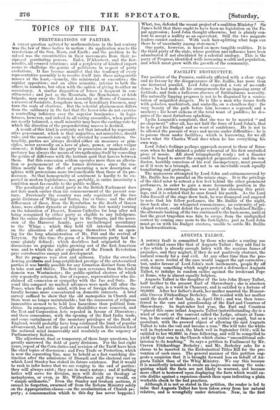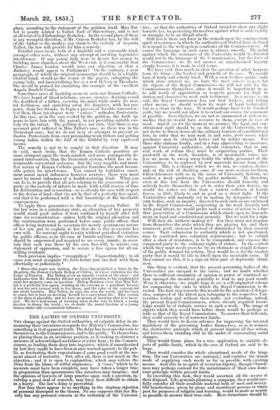AUGUSTA TALBOT.
A noustE fault is committed by those who make a canting use of individual cases like that of Augusta Talbot : they add fuel to a fire which is already enough laden with the noxious fumes of prejudice, and they neglect, if they do not positively obstruct, the natural remedy for a real evil. At any other time than the pre- sent, a mere recital of the case would suggest the apt corrective ; but, under favour of Lord John's mob incitements, people fly off from doing something which might protect a defenceless Augusta Talbot, to indulge in random sallies against the irrelevant Pope at Rome, who is almost equally helpless.
Augusta Talbot is the daughter of the late John Henry Talbot, half brother to the present Earl of Shrewsbury ; she is nineteen years of age, is a ward in Chancery, and is entitled to a fortune of 80,000/. After her father's death, her mother married the Honour- able Craven Fitzhardinge Berkeley. She resided with her mother until the death of that lady, in April 1841; and was then trans- ferred to the care and guardianship of the Earl and Countess of Shrewsbury. In September last year, the Earl and Countess "placed this same infant Augusta Talbot (notwithstanding she is a ward of court) at the convent called the Lodge, situate at Taun- ton, in the county of Somerset ; not as a visiter or pupil, but as a postulant, with the avowed object of allowing the said Augusta Talbot to take the veil and become a nun." She will take the white veil in September next, the black veil in September 1852; will be entitled to her 80,000/. in June following, and will be compelled to yield up that sum to the Church which claims "unconditional sub- mission to its teaching." So says a petition to Parliament by Mr. Craven Fitshardinge Berkeley • and Mr. Berkeley asks for a clause to be inserted in the Ecclesiastical Titles Bill for the pre- vention of such eases. The general manner of this petition sug- gests a suspicion that it is brought forward less on behalf of Au- gusta Talbot than of the Whig Ministry. We say this because it is manifestly intended to create an impression among the unin- quir. ing which the facts are not likely to warrant, and because more effort is bestowed upon displaying the facts which would ex- cite dislike against a rapacious church than upon indicating a plain workable cheek to the bad practices. Although it is not so stated in the petition, the reader is led to infer that Augusta Talbot has been taken away from her natural relative, and is wrongfully under detention. Now, in the first
place, according to the statement of the petition itself, Miss Tal- bot is nearly related to Talbot Earl of Shrewsbury, and is not at all related to Fitzhardinge Berkeley. In the second place, if there is any wrongful direction, if Mr. Craven Berkeley has, by the will of the father or the mother, any claim to the custody of Augusta Talbot, the law will provide for him a remedy. Parallel cases occur, both of a laudable and a censurable kind, amongst other sects, without any attempt at invoking legislative interference. If any young lady were to devote her money to building more churches about the West-end, is it conceivable that Charles James London would raise any objection, or that a Berkeley would appeal to Parliament? On the contrary, a neat paragraph, of which the original manuscript should be in a highly clerical hand, would go the round of the papers, eulogizing the young lady, and immortalizing her as a new Helena or Theodosia. She would be praised for emulating the example of the excellent Angela Burdett Coutts. Sometimes eases of hardship occur in sects not Roman Catholic. We have heard of blood relations, sworn enemies, flocking round the deathbed of a father, coercing his mind while under its mor- tal feebleness, and snatching away his daughter, with her pro- perty, from her friends, to begin a process of forcible conversion : but then, those interlopers were " serious " orthodox Protestants. In this ease, as in the case recited by the petition, the fault ap- pears to have lain with the parent, in not providing suitable cus- tody for the infant. The petition does not state that there is any personal grief inflicted in Miss Talbot's case, as there was in the Protestant case ; but we do not hear of attempts to prevent or- thodox Protestants from over-persuading weak fathers and getting young ladies within the fold of the faithful by very equivocal means.
The remedy is not to be sought in that direction. It may be said, most truly-, that the Roman Catholic practices are more stringent upon the weak-minded, and more peremptorily de- mand intervention, than the Protestant system, which has no in- terminable conventual seclusion. But the very tangible and mani- fest nature of Roman Catholic practice furnishes the most favour- able points for interference. You cannot by legislative enact- ment annul moral influences however noxious ; those you must meet by moral influences of a health-restoring kind. What you can do is, to provide that all acts relating to the possession of pro- perty or the custody of infants be made with a full reserve of time for deliberation and revocation—as is already the case with respect to the devise of land; that the act be that of a perfectly free agent, and that it be performed with a full knowledge of the inevitable consequences.
To apply these guarantees to the case of Augusta Talbot. If the law were in a satisfactory state, no alienation of her property would stand good unless it were confirmed by herself after full time for reconsideration—unless both the original alienation and the confirmation were performed before some public officer, that officer being instructed to ascertain the merely spontaneous nature of her act, and to explain to her that she is free to exercise her own will. No convent ought to exist without periodical visitation by public officers, as in the case of lunatic asylums; the visitors should be empowered and required to see every inmate, to ascer- tain that each was there by his own free-will, to receive any statement of oppression, and to secure a free egress for all un- willing residents.
Such provision implies "recognition." Unquestionably ; in all cases you must recognize the facts before you can deal with them effectually or judiciously.* * Since this paper was written, the Times has published a letter by Dr. Hendren, the Roman Catholic Bishop of Clifton, in whose visitation lies the Lodge at Taunton. The Bishop gives an opposite version of the story ; and insinuates that Mr. Berkeley did not pay much attention to his stepdaughter until her property came in question. Bishop Hendren avers that Miss Tal- bot is a perfectly free agent, residing in the convent as a postulant because it was her own earnest wish to live there, and the rules of the convent did not admit boarders. Miss Talbot, he says, has seen the world, and has been to court, but is bent on devoting herself to a conventual life. This version 4 the story is plausible, and we have no means of knowing that it is incor- rect. We have had means of knowing what is the way in which a young devotee is shown the world ; we do doubt the moral freedom of a young heiress under able ecclesiastical influence.



























 Previous page
Previous page